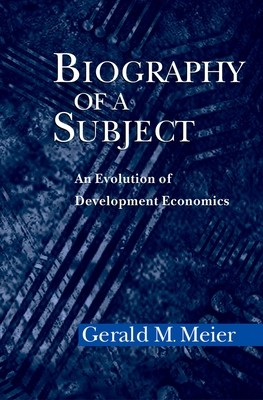
- We will send in 10–14 business days.
- Author: Gerald M Meier
- Publisher: Oxford University Press, USA
- ISBN-10: 0195170032
- ISBN-13: 9780195170030
- Format: 16.3 x 23.3 x 1.5 cm, minkšti viršeliai
- Language: English
- SAVE -10% with code: EXTRA
Reviews
Description
The study of economic development is one of the newest, most exciting, and most challenging branches of the broader discipline of economics and political economy. Although one could claim that Adam Smith was the first "development economist", the systematic study of the problems and processes of economic development in Africa, Asia, and Latin America has emerged only over the past five decades. This biography of the subject of economic development will focus on the essential ideas in the evolution of development thought and policy over the subject's half-century of life. In concise form and avoiding undue technicality, it highlights the influence of development theory on policymaking and on the mixed record of successes and failures in promoting development efforts. The interpretation of theory, policy, and the lessons of experience are covered in three periods: early development economics of the 1950s-60s; orthodox reaction of the 1970s-80s; and the new development economics
of the 1980s-90s. Gerald Meier-one of the world's most prominent leading thinkers in the economics of development - interprets the past treatment of development problems with the present and future in mind. He re-interprets the past two generations of development economists in a contemporary voice. And in a forward-looking fashion, the book's perspectives should make the next generation of development problems-and development economists-more intelligible. The reader is invited to consider whether development economists really know how to put matters right.
EXTRA 10 % discount with code: EXTRA
The promotion ends in 21d.23:58:18
The discount code is valid when purchasing from 10 €. Discounts do not stack.
- Author: Gerald M Meier
- Publisher: Oxford University Press, USA
- ISBN-10: 0195170032
- ISBN-13: 9780195170030
- Format: 16.3 x 23.3 x 1.5 cm, minkšti viršeliai
- Language: English English
The study of economic development is one of the newest, most exciting, and most challenging branches of the broader discipline of economics and political economy. Although one could claim that Adam Smith was the first "development economist", the systematic study of the problems and processes of economic development in Africa, Asia, and Latin America has emerged only over the past five decades. This biography of the subject of economic development will focus on the essential ideas in the evolution of development thought and policy over the subject's half-century of life. In concise form and avoiding undue technicality, it highlights the influence of development theory on policymaking and on the mixed record of successes and failures in promoting development efforts. The interpretation of theory, policy, and the lessons of experience are covered in three periods: early development economics of the 1950s-60s; orthodox reaction of the 1970s-80s; and the new development economics
of the 1980s-90s. Gerald Meier-one of the world's most prominent leading thinkers in the economics of development - interprets the past treatment of development problems with the present and future in mind. He re-interprets the past two generations of development economists in a contemporary voice. And in a forward-looking fashion, the book's perspectives should make the next generation of development problems-and development economists-more intelligible. The reader is invited to consider whether development economists really know how to put matters right.


Reviews